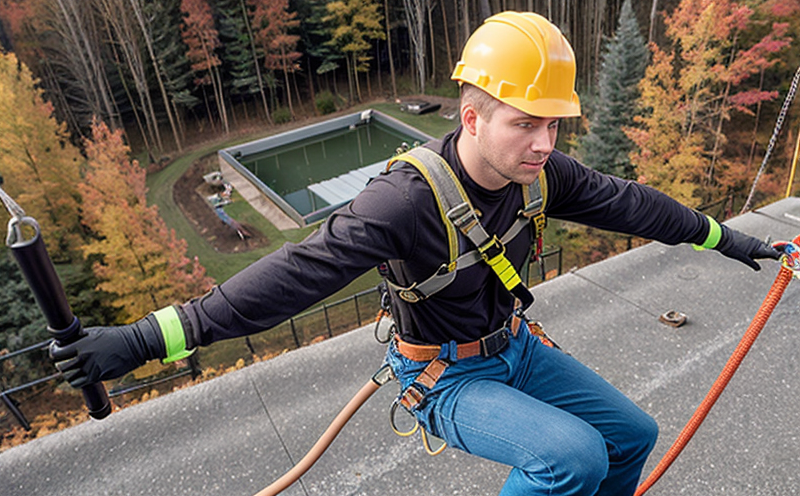ISO 10333-6 Connector Gate Strength Testing
The ISO 10333-6 standard provides a comprehensive framework for testing the gate strength of connectors used in fall protection and harness systems. This is crucial for ensuring that these connectors can withstand the forces they may encounter during use, thereby safeguarding workers in high-risk environments.
Connectors are integral components of personal protective equipment (PPE) designed to prevent falls from heights. These connectors typically consist of a male connector and a female connector that secure together to form part of a fall protection system. The gate strength test evaluates the ability of these connectors to maintain their integrity under specified loading conditions.
The testing procedure involves subjecting the connector gates to defined tensile forces, simulating real-world conditions such as sudden stops or impacts during a fall. This ensures that even in harsh environments, the connectors do not fail, potentially saving lives. The test is critical for compliance with international standards and ensuring product reliability.
During testing, it's essential to follow the exact procedures outlined in ISO 10333-6. This includes using the appropriate fixtures to hold the connector gates securely while applying the specified load in a controlled environment. The force applied is measured accurately, and the specimen is monitored for any signs of failure.
The testing process also involves rigorous preparation of the specimens, which must be free from defects that could affect test results. This includes cleaning, drying, and possibly conditioning the connectors to simulate real-world conditions. Once prepared, the connector gates are positioned in the testing apparatus according to the standard's specifications.
For accurate measurement and analysis, sophisticated instrumentation is used. The load cell measures the force applied during the test, while sensors monitor deformation and displacement of the connector gate. This data helps determine if the connector has maintained its structural integrity under the imposed stress.
The acceptance criteria for ISO 10333-6 are stringent to ensure high reliability and safety in fall protection systems. A successful test indicates that the connector gates can withstand the specified tensile forces without failure, thereby meeting the requirements set forth by this international standard.
Understanding the testing process and adhering strictly to the ISO 10333-6 specifications is crucial for manufacturers of fall protection equipment. Compliance ensures that their products meet stringent safety standards, which is vital in preventing accidents and protecting workers' lives.
The importance of this test extends beyond mere compliance; it reflects a commitment to quality and safety. By incorporating ISO 10333-6 into the manufacturing process, companies demonstrate their dedication to providing reliable and safe fall protection equipment.
Applied Standards
- ISO 10333-6: This standard specifies the method for testing the gate strength of connectors used in fall protection systems. It ensures that these connectors can withstand specified tensile forces without failure.
- ASTM F1947: This American Society for Testing and Materials standard provides similar requirements for connector gate strength testing, focusing on harness attachment mechanisms.
Industry Applications
The ISO 10333-6 connector gate strength test is widely used in industries where fall protection is critical. These include construction, oil and gas, utilities, and manufacturing sectors. In these environments, workers often operate at heights or near drop-offs, making proper harness attachment a matter of life and death.
By ensuring that connectors meet the stringent requirements set by ISO 10333-6, industries can safeguard their workers from potential accidents. This is particularly important in sectors where compliance with international standards is mandatory for safety certifications.
International Acceptance and Recognition
The acceptance of ISO 10333-6 extends globally, recognized by various regulatory bodies worldwide. This standard has been adopted in numerous countries to ensure that fall protection equipment meets the highest safety standards.
Many industries rely on this international standard for compliance with local and regional regulations. By adhering to ISO 10333-6, companies can ensure their products are not only safe but also meet the expectations of regulatory authorities in different markets.





